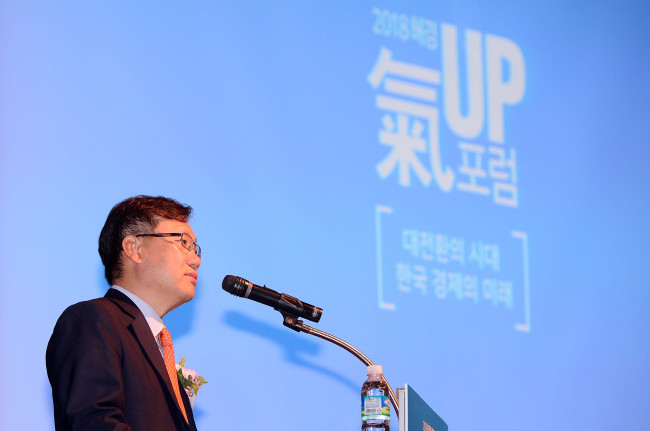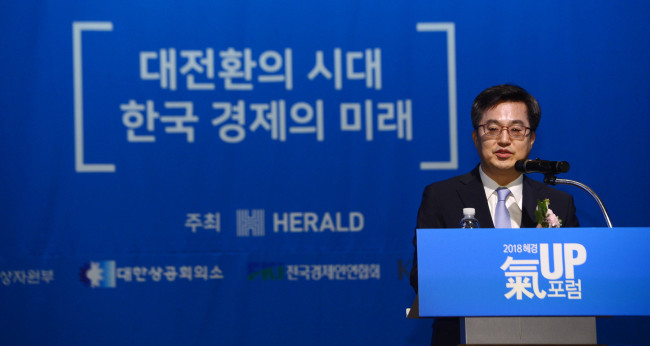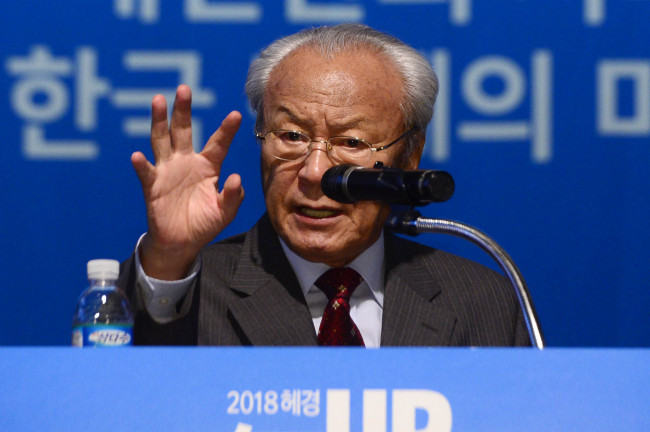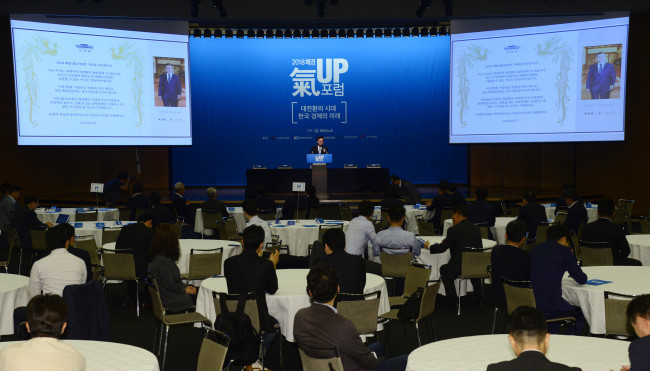NK thaw signals end to export-driven economy: Herald forum
By Son Ji-hyoungPublished : June 7, 2018 - 16:24
A tectonic shift is unraveling in and around the Korean Peninsula, especially in the wake of rapprochement mood and signs of denuclearization in North Korea, as well as trade war threats in East Asia.
But to businessmen here, the looming transformation in the world‘s most secluded state could translate into a change in environment to which they would be forced to adapt.
But to businessmen here, the looming transformation in the world‘s most secluded state could translate into a change in environment to which they would be forced to adapt.

Experts and veterans in economic fields in South Korea discussed ways to address the transformation, to some 200-strong audience comprising company representatives and economic scholars at the 2018 Herald Business 氣UP Forum held in the headquarters of Korea Chamber of Commerce and Industry in Seoul Thursday.
Deputy Prime Minister and Finance Minister Kim Dong-yeon and Herald Corp. Chief Executive Kwon Chung-won stressed in respective congratulatory speeches a need for local companies to brace for consequences of rapprochement mood and trade war threat, so that companies‘ side effects from such external shifts would be minimized.
“Korea is awaiting various challenges in the forthcoming year, because of trade conflicts between global powerhouses, domestic changes in the labor environment and uncertainties as to how the economic cooperation would unfold between the two Koreas,” Kim said.
Deputy Prime Minister and Finance Minister Kim Dong-yeon and Herald Corp. Chief Executive Kwon Chung-won stressed in respective congratulatory speeches a need for local companies to brace for consequences of rapprochement mood and trade war threat, so that companies‘ side effects from such external shifts would be minimized.
“Korea is awaiting various challenges in the forthcoming year, because of trade conflicts between global powerhouses, domestic changes in the labor environment and uncertainties as to how the economic cooperation would unfold between the two Koreas,” Kim said.

One of the consequences could be an end to the export-driven economy here that had led to exponential growth in Korea in the past decades, Park Seung, former governor of the Bank of Korea, claimed in a keynote speech.
With the advent of diplomatic thaw between the two Koreas, as well as North Korea and the US, South Korea is running into a paradigm shift involving replacing the driver for export-led economic growth with income-led growth designed to pick up domestic economy, he said.
“We are seeing a phase-out in an export-driven growth engine led by conglomerates,” said Park, who served a four-year term at the central bank’s top post until 2006. “But Korea was still stuck in a now-dysfunctional trickle-down effect created in the industrialization stage decades ago.”
With the advent of diplomatic thaw between the two Koreas, as well as North Korea and the US, South Korea is running into a paradigm shift involving replacing the driver for export-led economic growth with income-led growth designed to pick up domestic economy, he said.
“We are seeing a phase-out in an export-driven growth engine led by conglomerates,” said Park, who served a four-year term at the central bank’s top post until 2006. “But Korea was still stuck in a now-dysfunctional trickle-down effect created in the industrialization stage decades ago.”

A fountain effect should take the place of the trickle-down effect, so that a minimum wage hike and the following increase in domestic consumption prompts pickup in Korean companies‘ performance, he added.
Park also emphasized the need for South Korea to invest in North Korea, despite the possible backlash from oppositions.
The forum tapped into two major pillars -- a changing landscape in global trade and a labor-friendly state policy in Korea.
Kim Jong-hoon, formerly a career diplomat, trade minister and lawmaker, and Lee Dong-geun, chief of a think tank, Hyundai Research Institute, discussed ways to cope with the escalating trade war threat between China and the US.
Head of Korea Labor Institute Bae Gyu-sik and Director-General at Korea Employers Federation Lee Dong-eung discussed possible consequences from Korea’s labor policy changes involving a minimum wage hike and a drop in the maximum workweek to 52 hours.
During the interlude, Kim Young-hui, head of North Korea Economic Research Team at the state-led Korea Development Bank, offered the audience a glance at policy-driven economic development through innovation under the Kim Jong-un regime. The North Korean defector-turned-economist here also called for South Korea, replete with experience in economic development, to engage in the North‘s development.
Park also emphasized the need for South Korea to invest in North Korea, despite the possible backlash from oppositions.
The forum tapped into two major pillars -- a changing landscape in global trade and a labor-friendly state policy in Korea.
Kim Jong-hoon, formerly a career diplomat, trade minister and lawmaker, and Lee Dong-geun, chief of a think tank, Hyundai Research Institute, discussed ways to cope with the escalating trade war threat between China and the US.
Head of Korea Labor Institute Bae Gyu-sik and Director-General at Korea Employers Federation Lee Dong-eung discussed possible consequences from Korea’s labor policy changes involving a minimum wage hike and a drop in the maximum workweek to 52 hours.
During the interlude, Kim Young-hui, head of North Korea Economic Research Team at the state-led Korea Development Bank, offered the audience a glance at policy-driven economic development through innovation under the Kim Jong-un regime. The North Korean defector-turned-economist here also called for South Korea, replete with experience in economic development, to engage in the North‘s development.

By Son Ji-hyoung
(consnow@heraldcorp.com)
(consnow@heraldcorp.com)



![[Exclusive] Korean military set to ban iPhones over 'security' concerns](http://res.heraldm.com/phpwas/restmb_idxmake.php?idx=644&simg=/content/image/2024/04/23/20240423050599_0.jpg&u=20240423183955)




![[Pressure points] Leggings in public: Fashion statement or social faux pas?](http://res.heraldm.com/phpwas/restmb_idxmake.php?idx=644&simg=/content/image/2024/04/23/20240423050669_0.jpg&u=)

![[Herald Interview] 'Amid aging population, Korea to invite more young professionals from overseas'](http://res.heraldm.com/phpwas/restmb_idxmake.php?idx=644&simg=/content/image/2024/04/24/20240424050844_0.jpg&u=20240424200058)









